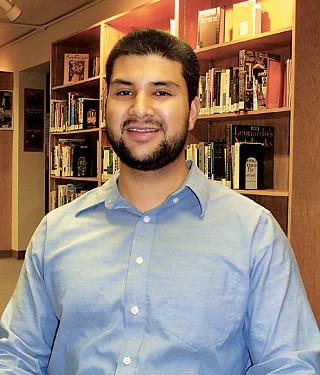Sol Gómez, manager of the Sam Lena-South Tucson Branch of the Pima County Public Library, was recently given an I Love My Librarian Award, along with 10 other librarians from across the country, by the Carnegie Corporation of New York and The New York Times. Gómez, who was nominated by Pima County Supervisor Ramón Valadez, received $5,000 and traveled to New York for an awards ceremony on Dec. 3. For more information about Gómez and the award, visit www.ilovelibraries.org/ilovemylibrarian. For more information on the Sam Lena Library, go towww.library.pima.gov/locations/southtucson.
How did you find out about the award?
I got a phone call in late October or early November from Jim Rettig, president of the American Library Association. It seemed a little odd. I wasn't sure someone was pulling a prank on me. I was quiet at first; he was wondering if I was still on the line. I felt a little off. Out of 3,200 nominations, I felt like I almost didn't deserve it. I'm enjoying it now.
What was the awards ceremony like?
The ceremony was at The New York Times building. The president of Carnegie Corporation gave a great speech about how libraries are in the business of immortality. It was pretty intense, and it made me even more proud of my profession.
You were a county employee before, and you left to get a master's degree in library science. Why?
My sister-in-law was going to library school, and my mother-in-law was a librarian. One day, my sister-in-law told me about the program called Knowledge River at the UA. It teaches librarianship and tries to recruit Latinos and Native Americans to work in their communities when they graduate. I applied for it and got it.
Was becoming a librarian more work than you imagined?
Before library school, I had the same stereotypes other people probably have. They just don't know how much we are involved in communities, especially public libraries, and especially in Pima County. We are really involved in community outreach.
What do you think is the most important part of your job as the branch manager?
Making sure we're providing relevant programs for the community and working with the people to understand what they need. You can offer a lot of programs that you think are needed, and no one is going to show up. And sometimes, even when they are programs that are requested, people don't show up if we don't get the word out. We've discovered that word-of-mouth works really well here.
Did you make specific changes when you were hired in 2006?
(My hire) was probably the major change, and we've done some physical changes to the library. We've added a teen area with the help of the library administration. Also, the branches have new computers. ... There were a lot of managers ... coming in and out. They finally found one who fit in, and I've been here ever since.
Tell me about Tecnológico de Monterrey.
It's a computer class taught entirely in Spanish that comes from Mexico. ... I was actually teaching the classes at the Santa Rosa branch library. When I got there, there was a 75-person waiting list. We've been lucky to work with the UA Honors College. I worked with them to create our own curriculum. Now we teach it in English and Spanish, and it's geared toward people looking for jobs.
You're doing a project with the UA College of Nursing, on health literacy, that one might not expect from a library. Why?
When I was in school, my internship was with the Arizona Health Sciences Library. They sent me to the Medical Library Association conference. I attended a lot of presentations on health literacy and learned what libraries can do about this. I've seen this with my own family: Sometimes, people hold off before getting (medical) help, but by then, it's too late. After I became a member of the Pima County Community Health Task Force—made up of librarians, nurses and people working in the health field—I met with the UA College of Nursing. They wanted to do a community assessment in South Tucson ... and we came up with the possibility of projects we could do in the community to increase health literacy. We haven't started yet. We're still trying to get some grants and money to get those projects started.





